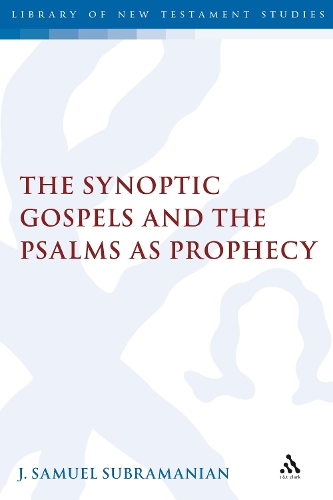
The Synoptic Gospels and the Psalms as Prophecy
(Hardback)
Publishing Details
The Synoptic Gospels and the Psalms as Prophecy
By (Author) Dr. J. Samuel Subramanian
Bloomsbury Publishing PLC
T.& T.Clark Ltd
1st October 2007
United Kingdom
Classifications
Professional and Scholarly
Non Fiction
Criticism and exegesis of sacred texts
226.06
Physical Properties
Hardback
192
Width 156mm, Height 234mm
454g
Description
The Book of Psalms is one of the most frequently cited books in the New Testament. The Synoptic Evangelists seem to read the Psalms not primarily as prayers but as prophecies of the future. They discovered in its language prophecies concerning the life and ministry of Jesus and attempted to show how Jesus' life was prefigured in the Psalms. Samuel Subramanian examines the topic within the broader use of the Old Testament in the New Testament, that of the prophetic reading of the Psalms in the Synoptic Gospels and in the context of Second Temple Judaism. Although others have treated individual psalm quotations as prophecy, my work is the first to examine all of the psalm quotations within the Synoptic Gospels in this light and the first to demonstrate that these excerpts were used prophetically. In some cases, these psalm quotations were used by the Synoptic Evangelists in a manner that is thought to fulfill a prophecy from or about Jesus within the gospel narratives, even though this particular use of the psalms by the Synoptic Evangelists has not been widely recognized previously. This study shows how similar exegetical techniques of looking for prophecies in the Psalms was practiced by non-Christian Jews of the period.
Reviews
Review in International Review of Biblical Studies, vol. 54:2007/08
"The author is very agile in his ability to illustrate the multivalent uses of the Psalms by the Synoptic Gospel authors, as well as elucidating the different contexts within which they are framed in the different Gospels than in their original context in the book of Psalms." -- Edward J. Mills III * RBL *
"This book will be most useful to specialists in synoptic comparison studies." - Thomas E. Phillips, Religious Studies Review, June 2008 -- Thomas E. Phillips * Religious Studies Review *
"Subramanian's prose...is clear, concise, and stylistically good. One does not wonder what he is, or is not, saying. The book is well and clearly organized. Each chapter on the respective Synoptic Gospels is tightly arranged around the themes of (1) text; (2) context of the Psalm text (in the Gospel and the Original Psalm setting); (3) prophetic reading of the psalm in the New Testament quotation; and (4) conclusion. It was helpful that Subramanian examines each Synoptic parallel within the context of its own Gospel first before synoptically (re: the Synoptic Problem). The author is very agile in his ability to illustrate the multivalent uses of the Psalms by the Synoptic Gospel authors, as well as elucidating the different contexts within which they are framed in the different Gospels than in their original context in the book of Psalms. Their meanings are often transformed in their service to the Gospel writers...In fine, I enjoyed this book. As one who spends a lot of time in the pulpit, I shall return to it again and again to examine the way the Psalm texts were proclaimed as prophecies of the coming of the Christ. As mentioned above, Subramanian, when he writes upon the rationale of the Synoptic use of the Psalm texts, makes their thought and beliefs compellingeven to modern hearers. He also is particularly persuasive in how they also tie into the thought of the Gospel materials around them, their new context. Good work this." -Edward J. Mills III, Review of Biblical Literature, November 2008 * Review of Biblical Literature *
"There is no doubt that Subramanian fulfills the desideratum he identified in the very beginning of his book; he offers the first comprehensive investigation into the reading of the Psalms in the Synoptic Gospels as prophetic texts. His observations are sound, his method is well thought-out, and the conclusions he draws are compelling. With this study he serves different areas of research (New Testament and Old Testament exegesis, source criticism, Septuagint research, just to mention a few). It is a landmark study for all those who will examine this topic or dedicate their research to similar topics in the future, and it raises questions that must really be addressed again, among them, above all, the source question." -Thomas J. Kraus, Review of Biblical Literature, November 2008 * Review of Biblical Literature *
Author Bio
J. Samuel Subramanian is currently serving as Visiting Professor of New Testament, Bangor Theological Seminary, Bangor and Portland, Maine.
